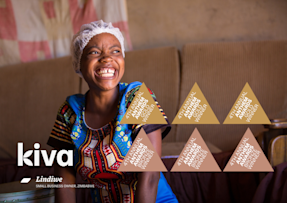Kiva is committed to promoting sustainable progress -- and a huge part of that is encouraging clean energy. That's why we're very excited to welcome Nuru Energy as our newest Field Partner in Rwanda.
Nuru is a socially-driven corporation that provides renewable sources of energy in developing countries. Seed funded by the World Bank in 2008, it currently operates in East Africa and India.
The organization is on a mission to eradicate energy poverty -- the lack of electricity (and economic activity that comes with it) that affects over 2 billion people around the world. To address this problem, it developed a user-friendly, off-grid re-charging platform called the Nuru POWERCycle pedal generator.
Resembling a piece of exercise equipment, the POWERCycle provides sustainable power anytime anywhere and is more efficient that current solar-based solutions at a significantly lower cost.
Here's how it works:
Integrating with Nuru's other energy products, the POWERCycle can be used to recharge the company's modular light-emitting diode (LED) lights. The cycle can recharge these lights five at a time in 20 minutes so that they provide up to 10 days of light for rural households.
Like several other Kiva Field Partners, Nuru gets this technology into rural and remote regions through a network of trained, savvy resellers. This doubles the benefit -- promoting adoption of clean energy while also giving retailers the tools they need to generate additional income.
In the Nuru ecosystem, these resellers are called Village-Level Entrepreneurs, or VLEs. And instead of selling the POWERCycle itself, VLEs sell the company's lights to consumers. They keep the POWERCycles themselves and recharge customers' lights for a small fee at dedicated micro-kiosks -- allowing them to make a consistent income.
According to Nuru, one POWERCycle can service 200 lights and provide 100 families with improved lighting. This could save $17,500 to $47,500 in lighting costs over five years. It could also help 300 children study at night and spare 500 people from inhaling toxic fumes from kerosene lights every month -- not to mention slash greenhouse gas emissions by 80 tons annually.
For its efforts, Nuru Energy has been recognized by the World Economic Forum and the Schwab Foundation.
Want to promote clean, affordable and sustainable energy in rural Rwanda?
SUPPORT A NURU ENERGY RETAILER TODAY!
Have questions about Nuru Energy? Send them our way at blog@kiva.org.
Media courtesy of Nuru Energy.
PREVIOUS ARTICLE
New Field Partner: Empowering women borrowers in Honduras with COMIXMUL →NEXT ARTICLE
What's new on Kiva? →














